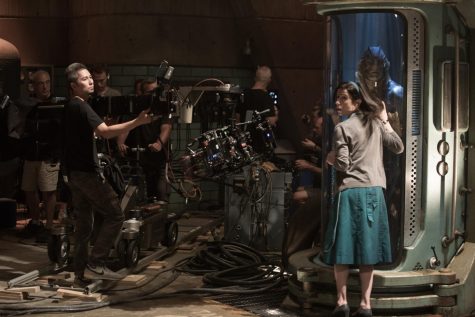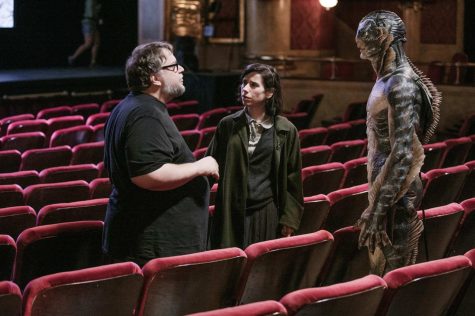“The Shape of Water” makes a splash this awards season
“The Shape of Water,” nominated for 13 Academy Awards this season including best picture, was created under the premises of careful, devoted storytelling and wild imagination. Directed by Guillermo del Toro, the genre-defying film set during the Cold War is as fluid and complex as water itself, a fairytale for grown ups that seems to come at the perfect time.
The movie follows Elisa Esposito, a mute cleaning lady played by an enchanting Sally Hawkins as the antagonist, or “silent princess” of the story. She lives kiddy corner to Giles (Richard Jenkins), a closeted homosexual man (living in 1962) and one of her two closest friends. She follows the same schedule every morning to her work where she cleans a dreary government laboratory with her second friend, Zelda, played by the always wonderful Octavia Spencer. Both Jenkins and Spencer are Academy Award nominated for their engaging performances.
Spencer’s character goes on and on (and on) throughout their seemingly bland days about her husband Brooster, her endless stream of thought contrasting with our antagonists’ silent and comedic reactions to these never ending stories. These dull days take a turn when Colonel Richard Strickland (the imposing presence of Michael Shannon) shows up with a precious government secret in a tube.

This mysterious water tube contains a thing later explained as a half fish half man God-like creature, or the Amphibian Man. The Amphibian Man is portrayed by cinema chameleon Doug Jones, who has played various creatures such as Abe Sapien in “Hellboy” along with both Pan and Pale Man in “Pan’s Labyrinth”. He develops a bond with Elisa, her teaching him sign language, feeding him, and showing him compassion. The friendship blossoms besides their physical and linguistic differences, growing into something beautiful and sincere in a dreary world of government corruption, abuse at the hands of the abhorrent Strickland, and alienation.
Under the (mutilated) hands of Michael Shannon, Strickland is an imposing cinematic force that has audiences twitching in their seats with his every move. Shannon, like cheese, wine, and Michael Shannon, has only gotten better with age. His performances in all his films layer a characteristic intensity with acting expertise, precision, and the exuding of a quiet, humble confidence. The unlikable Strickland is no exception. As the classic antagonist, he’s clearly up to no good by no good means, making even the simplest activities cast with a shadow of darkness (exp: eating candy).
Shannon isn’t the only one flexing his acting chops with a refined maturity in this film. The rest of the supporting cast flawlessly seam the world together, with faces like the already mentioned Richard Jenkins, Octavia Spencer, and seasoned actor Michael Stuhlbarg. Stuhlbarg, seen in another nominated film this year, “Call Me by Your Name,” is excellent as the devoted scientist Dr. Robert Hoffstetler (aka Dimitri Antonovich Mosenkov). Dr. Hoffstetler has ties with the Russian mafia, and this undercover alliance builds the character’s internal conflict – the mafia wants the Amphibian Man dead, but he wants to protect the fish creature because of scientific integrity.
When they announce they want to dissect the Amphibian Man, the plot plummets forward. Elisa can’t lose him, as she explains in a brutally poignant monologue as she signs “when he looks at me, he does not know how I am incomplete.” Hawkins delivers the monologue with an emotional intensity so masterfully captured in only her movements and expressions. She is shockingly vulnerable, beautifully honest, and says more with just her eyes than most people can ever attempt to with their voices. I was unable to take my eyes off of Hawkins the entire movie, her expressive eyes and gestures drawing audiences from the busy world she inhabits to her overwhelmingly compassionate performance. She is a force of nature, an immovable woman finding a voice within her silence.
Because of her pleas, Giles decides to help her. Struggling with his own emotional hardships, being rejected by his long-time crush (and discovering the seemingly friendly man is both racist and homophobic), he decides to help his friend keep the one person who seems to make her truly happy, both of their worlds overcast with their unavoidable differences. It also highlights the dangers of indifference, as Elisa points out that if they let the Amphibian Man die they are no different from the men who’ve left him susceptible to these horrible conditions. The next part of the film plays out with their attempted espionage, aided by Dr. Hoffstetler who also wants to help get the creature out. By smuggling him into a laundry truck, they are able to escort the Amphibian Man back to his new home, Elisa’s bathtub.

At her home, the silent friendship between Elisa and the Amphibian Man grows into something more. Although some were skeptical about the romance between the two, I loved their connection. Unlike stories that follow a similar plot to beauty and the beast, neither are changed when they decide to be with each other. They are able to be with each other not only in spite of their differences, but because they are different. Their acceptance of each other and the compassion they share naturally grows into love, and is the centerpiece of the unorthodox fairytale. It is a simple and beautiful story of being loved in spite of whether you can speak or not speak, whether you’re a human or an amphibian creature with God-like healing powers.
The end of the movie plummets forward at an incredible speed, keeping audiences on their toes. While the film spans many genres, the last fifteen minutes certainly satisfy the “thriller” aspect. The moving parts in this film absolutely work, and the core of the story, the romance between Elisa and the Amphibian man, remains as it’s ever present beating heart.
Del Toro’s direction is able to bring focus to these more nuanced themes, bringing them to the center in the very busy world the characters live in. Each subplot is handled carefully and given as much love as the main thread, whether it be Strickland’s family life, Giles’s struggles as a homosexual man, or Dr. Hoffstetler’s Russian ties. The score, composed by Alexandre Desplat, brings an enchanting and whimsical touch to the moments set against a mundane or clinical backdrop, giving Elisa’s bus rides and her first encounters with the Amphibian Man a touch of magic.
And that’s what this film is. While the overall premise may be crazy to try to explain to someone who hasn’t seen it (“Well, there’s this woman, and she’s mute, and she cleans a laboratory and then steals a fish man… Oh, and there’s this really awful man who abuses the fish thing and loses his fingers and I think the Russian mafia is in it…”), it’s a touch of magic in a world so in need of magic. It’s accolades are well deserved, an unconventional love story sure to stand the test of time.

Ellie Ryan is a senior and is so excited for her fourth year on York-hi! This is her second year as Editor-in-Chief, and her third year of being an editor...









